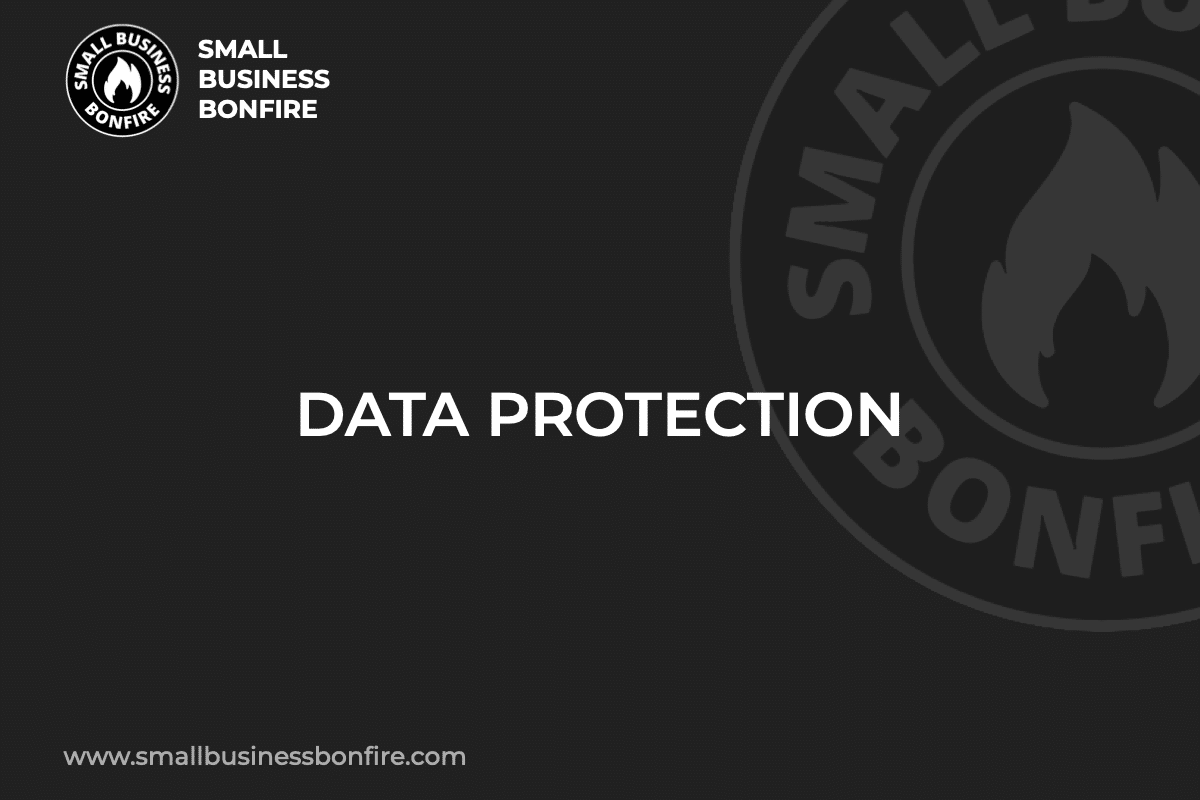Does your company have measures in place to protect its data assets? If a data breach happens, will your business survive?
If this is the first time you’ve thought about questions like this, you’re not alone! Several companies need help with data protection measures.
Hi! I’m AJ! After selling my company for multiple seven figures, I started Small Business Bonfire to help entrepreneurs achieve their dreams.
Scaling my business was challenging, but I was able to overcome the obstacles with a strong team and effective systems in place. One of those systems was data protection.
But what exactly is data protection, and why does it matter to SMB owners? Let’s dive in and find out!
Key Takeaways
- Recognizing the importance of data protection is critical for the survival and success of any business.
- Businesses must know the potential risks of data breaches and take preventive measures to safeguard data assets.
- The US, EU, and Australia each have varying data protection laws that companies must follow.
- Protecting data helps build customer trust because they know their sensitive information is safe.
Related Reading: Best CRM for Small Businesses
SBB Featured Partners
Best For Small Businesses

Try Freshworks Free
Freshworks Review
Best All-Around CRM

Try HubSpot Free
HubSpot CRM Review
Best Budget CRM

Try Pipeline Free
Pipeline Review
What is Data Protection?
Data protection is when companies guard sensitive information from loss, damage, or corruption.
Over the past decade, data security has grown increasingly important because there is significantly more data created and stored by companies and consumers.
On top of that, business processes have grown increasingly dependent on data to function correctly.
Even a small amount of data loss can prove detrimental to some businesses.
When companies don’t implement data protection policies and practices, some things that can happen include the following:
- Financial loss
- Damage to the company’s reputation
- Loss of customer trust
- Legal liabilities
Data protection is a primary focus point for several small businesses because they want to earn potential and current customer trust.
Therefore, typical data protection strategies focus on three things, which include the following:
- Data security: Protecting data from intentional or accidental damage
- Data availability: Restoring data quickly if there is damage or loss
- Access control: Data must be accessible to people who need to, and nobody outside that circle
In the next section, we’ll observe the three principles of data protection every company must consider!
Principles of Data Protection
There are three principles of data protection, which include:
- Data availability
- Data management
- Information cycle management
Here’s what you need to know about each of these principles!
Data Availability
Data availability refers to the accessibility and usability of data whenever and wherever it is required.
Further, this principle emphasizes the need for data to be readily recoverable in case of loss or damage, ensuring the seamless continuation of business operations.
Therefore, data availability involves strategies like:
- Data backup
- Data replication
- Procedures for quick data recovery
Data Management
Data management is collecting, keeping, and using data securely, efficiently, and cost-effectively.
Also, data management is critical to an organization’s business strategy as it helps ensure the data they collect remains accurate, consistent, and accessible.
Proper data management not only facilitates the smooth functioning of a business but also aids in the following things:
- Companies making informed decisions
- Compliance with regulatory requirements
- Protection against data breaches
Using a customer relationship management (CRM) system is one of the easiest ways to manage and organize data.
Information Cycle Management
Information cycle management focuses on assessing, classifying, and protecting information.
Further, the primary goal of information cycle management is to prevent application and user errors.
Additionally, this practice aims to prevent the following things:
- Malware attacks
- Ransomware attacks
- System crashes
- System malfunctions
- Hardware failures
Put simply, information cycle management aims to prevent unauthorized access to company data to protect data!
Pro Tip #1: Hire a data protection expert to help your company organize and safeguard its sensitive information if you need help knowing where to start.
– AJ Silber
What Is Data Privacy and Why Is it Important?
Data privacy is about the right to keep your personal information private.
Imagine if your diary got into the hands of someone else, pretty bad, right?
Data privacy works the same way but with your digital information.
Examples of digital information could be anything from your name and address to your favorite pizza toppings.
Why is keeping personal data private so vital?
Well, imagine if someone you didn’t know personally knew everything about you – creepy, right? That’s why it’s essential to protect personal data!
Further, companies have to respect your data privacy, meaning they can’t just share or misuse your information without your permission.
So, just like you wouldn’t want everyone at school reading your diary, it’s crucial to keep your digital data private, too.
Data Protection vs Data Privacy
Data protection and data privacy are two sides of the same coin.
Many small business owners get confused because these terms sound very similar.
Here’s what you need to know.
Data protection is like a locker in your school.
You use your locker to keep your stuff safe from getting lost, damaged, or stolen.
Further, your locker ensures your belongings are secure and available when needed.
Like this locker, companies use data protection to keep their digital information secure and recoverable.
On the other hand, data privacy is like your school’s rules about not going through other students’ lockers.
These rules respect and protect your personal space and the stuff you keep in your locker.
Similarly, data privacy is about rules that prevent companies from inappropriately using or sharing your personal data without your permission.
In summary, while data protection deals with the safety and recoverability of data, data privacy is all about respecting the ownership and confidentiality of the data.
Enterprise Data Protection Trends
There have been a few data protection trends recently.
Why is it necessary to know about these trends? Well, if your business wants to remain trustworthy, it must have a data protection strategy!
Let’s look at four data protection technologies!
Hyper-Convergence
Hyper-convergence systems are rapidly replacing many traditional data protection systems because they provide cloud-like capabilities.
With a hyper-convergence system, businesses can backup and recover data in one device.
Further, this device integrates compute, networking, and storage infrastructure!
Ransomware Protection
Ransomware protection is a crucial security measure that prevents and mitigates ransomware attacks.
Ransomware attacks are malicious software designed to block access to a computer system until a company pays a certain sum of money.
A comprehensive ransomware protection strategy involves the following things:
- A combination of security software to detect and block these threats
- User education to avoid risky behavior
- Regular data backups to ensure data can be restored if an attack occurs
Essentially, it’s a multilayered approach that seeks to prevent attacks, protect sensitive data, and ensure swift recovery during a breach.
Disaster Recovery as a Service
Disaster recovery as a service (DRaaS) is a cloud-based system that lets a company create a remote copy of local systems.
Some DRaaS systems even allow businesses to create a copy of an entire data center.
Companies use these copies to restore operations if there is a disaster.
Copy Data Management (CDM)
Copy Data Management (CDM) is an approach that reduces storage costs and improves efficiency by minimizing the production of redundant copies of data.
Further, CDM involves creating virtual copies or snapshots of data, which businesses can use for backups, testing, or data analysis.
As a result, this eliminates the need for multiple physical copies.
By centralizing the control of data copies, CDM ensures optimal resource utilization and improves data accessibility and protection.
Pro Tip #2: Conduct regular data reviews to ensure your information is organized and safe; although it’s time-consuming, it’s better than dealing with a data breach!
– AJ Silber
Data Protection Strategies
Finding a data protection strategy that works for your company is crucial.
Fortunately, there are several strategies to protect sensitive data.
Let’s analyze the most popular data protection strategies!
Audit of Sensitive Data
A data protection technique is auditing company information before anything else.
At this stage, you must do the following things:
- Identify data sources
- Understand company data types
- Identify the storage infrastructure that your business uses
After that, you must classify data into sensitivity levels and see what data protection methods already exist.
Assessing Internal and External Risks
Another data protection strategy is to assess internal and external security risks.
Then, as you implement data protection technology, it will revolve around the risks you and your team identify.
Some examples of internal risks include the following:
- Errors in IT configuration
- Errors in security policies
- Lack of strong passwords
- Poor authentication
- Unrestricted access to storage services or devices
On the other hand, some examples of external threats include the following:
- Phishing
- Malware distribution
- Attacks on corporate infrastructure
- Distributed denial of service (DDoS)
Defining a Data Protection Policy
Defining a data protection policy refers to establishing rules, procedures, and standards for preserving and managing an organization’s data.
Further, a data protection policy outlines how data should be handled, stored, accessed, and shared to ensure its integrity, confidentiality, and availability.
Further, these policies encompass the following things:
- Backup procedures
- Security measures
- Protecting the privacy of data
- Disaster recovery plans
- Compliance with legal and regulatory requirements
Security Strategy
Providing continuous data protection is critical.
Regarding security strategies, companies must think about the following things:
- Taking measures to prevent threats from accessing personal data and other sensitive information
- Ensuring security measures don’t impact productivity
- Ensuring security measures don’t prevent employees from accessing information when and where they need it
- Managing data backups effectively to avoid ransomware and other threats
Compliance Strategy
Finally, every data protection strategy must take compliance obligations into consideration.
For instance, certain industries or products might be subject to various regulations or compliance standards.
Some of the most significant regulations that impact the protection of personal data include the following:
- European Union (EU)
- Data protection laws in the United States
- Data protection laws in Australia
Let’s look at the compliance standards associated with each of these entities!
European Union (EU): the GDPR
The General Data Protection Regulation (GDPR) impacts every company that does business with EU citizens.
The GDPR is in effect for companies whether or not they are located in the European Union.
If businesses fail to comply with these regulations, they can face fines of up to 4% of worldwide sales or 20 million euros!
What does the GDPR protect against? These regulations protect things like:
- Names
- ID numbers
- Date of birth
- Addresses
- Web analytics data
- Medical information
- Biometric data
Data protection laws in the USA
The data protection laws in the United States are not as severe as they are in Europe.
Still, the US has several regulations that impact data protection.
One aspect of regulatory compliance is email archiving. Enterprise email archiving involves systematically storing and managing emails for compliance and legal purposes. Industries such as finance, healthcare, and legal sectors benefit significantly from email archiving, ensuring compliance with regulations like HIPAA and SEC requirements.
Some of these regulations include the following:
- The Federal Trade Commission Act: This act requires companies to respect consumer privacy and follow privacy policies.
- The Health Insurance Portability and Accountability Act (HIPAA): This act regulates how health information is stored and used, ensuring it remains confidential.
- The Gramm Leach Bliley Act (GLBA): This act regulates the collection and storage of personal data by financial institutions.
- The California Consumer Privacy Act (CCPA): This act protects California residents and ensures they can access their personal information, request deletion, and request their data isn’t collected or resold.
Data protection laws in Australia
Lastly, there are data protection laws in Australia.
The Australian Prudential Regulatory Authority (APRA) introduced CPS 234 in 2019, which are mandatory data privacy regulations.
CPS 234 requires companies to improve security measures to protect data from attacks.
Also, CPS 234 applies to the following organizations:
- Accredited deposit-taking institutions
- General insurance companies
- Life insurance companies
- Private health insurance organizations
- Companies licensed under RSE
Critical Best Practices for Ensuring Data Privacy
What are examples of best practices for continuous data protection?
Some examples of best practices include the following:
- Data security
- Taking inventory of your data
- Minimizing data collection
- Being open with who uses your data
- Protection personal data
Let’s look at each of these best practices in closer detail!
Data Security
Data security refers to the set of standards and technologies that are implemented to ensure data is protected from the following things:
- Unauthorized access
- Corruption
- Theft
Further, data security encompasses a broad range of protective digital privacy measures that are applied to prevent unauthorized access to computers, databases, and websites.
Further, data security is pivotal in the following aspects:
- Ensuring the integrity and privacy of sensitive information
- Preventing data breaches
- Complying with various privacy laws and regulations
Inventory Your Data
Taking inventory of your data involves identifying and categorizing all of the data within an organization.
On top of that, taking inventory involves understanding where it is stored and who has access to it.
This process is critical for the following things:
- Maintaining data protection
- Managing data effectively
- Ensuring compliance with privacy regulations
Minimize Data Collection
Minimizing data collection is essential as it reduces the risk of exposing sensitive data in case of a data breach.
Also, it simplifies compliance with various privacy regulations, as having fewer data to manage and protect means fewer chances for potential compliance issues.
Be Open with Your Users
It is vital to be transparent with your users about how their data is collected, used, and stored.
Firstly, it builds trust and enhances your brand reputation, as users are likelier to trust and engage with organizations that respect their privacy.
Secondly, transparency is often a legal requirement under many data protection and privacy laws.
Therefore, staying transparent helps your organization comply with regulatory standards and avoid potential fines or legal repercussions.
Protection of Personal Data
Protecting personal data is critical to upholding an individual’s right to privacy and ensuring personal safety.
Misuse of sensitive information could lead to any of the following things:
- Potential harm
- Identity theft
- Financial fraud
Also, personal data protection helps organizations maintain customer trust, comply with various data protection laws, and avoid possible legal and financial repercussions!
Data Protection Examples
What are some examples of data protection in the real world?
Below, I’ve provided three examples of how certain companies can implement data protection practices to build customer trust and adhere to data-related laws.
Let’s take a look.
Example 1: Two-Factor Authentication in Banking
Many banks have now implemented two-factor authentication for online banking services.
Two-factor authentication adds an extra layer of security by requiring users to provide two different authentication methods.
Usually, the factors of authentication are a combination of something a customer knows, such as a password or PIN, and something they have, such as a smartphone, to receive a one-time code.
Using two-factor authentication is a practice that ensures even if a cybercriminal manages to get hold of a user’s login credentials, they still can’t access the account without the second authentication factor.
Two-factor authentication helps prevent fraud and unauthorized purchases.
Example 2: End-to-End Encryption in Messaging Apps
Applications like WhatsApp and Signal use end-to-end encryption to protect the privacy of their users.
With end-to-end encryption, only the sender and recipient of a message can read its content.
Therefore, even the service providers themselves cannot decrypt the messages.
As a result, even if someone intercepts the messages, they would be unable to read them, ensuring the privacy and security of user communications.
Example 3: Use of VPNs for Secure Internet Connection
Virtual Private Networks (VPNs) are commonly used by individuals and organizations to enhance their online security and privacy.
What does a VPN do?
A VPN masks the user’s IP address and routes their internet traffic through a secure and encrypted tunnel.
As a result, it makes it much harder for third parties to track online activities or steal data.
Also, this tool is especially useful in safeguarding sensitive information when using public Wi-Fi networks, which are often less secure and more vulnerable to cyberattacks.
Final Thoughts on Data Protection
Data protection is when companies take action to prevent sensitive information from being stolen, getting lost, or getting damaged.
Data protection regulations ensure organizations follow certain rules to protect online shoppers.
Still, when companies are transparent about their data protection policies, they’re likelier to gain customer trust!
What data protection policies does your company implement? Let us know in the comments section before!
Good luck with data lifecycle management and protection for your business!

